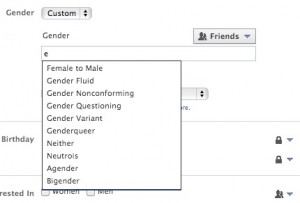Facebook and the liberal arts curriculum reveal a diminished, reductive America
 Facebook’s decision to add something like 50 new gender identification categories to its “about me” section caused a small flurry of interest in the news and in social media. Progressives embraced the change because it’s a step towards ending the stultifying limitations of male and female. Conservatives were upset by the change because they believe that, while human sexuality is variable, those stultifying limitations of male and female are necessary ingredients for a functioning society. Engineers noted that Facebook put the new system in place primarily to make for more targeted, and therefore more profitable, advertising.
Facebook’s decision to add something like 50 new gender identification categories to its “about me” section caused a small flurry of interest in the news and in social media. Progressives embraced the change because it’s a step towards ending the stultifying limitations of male and female. Conservatives were upset by the change because they believe that, while human sexuality is variable, those stultifying limitations of male and female are necessary ingredients for a functioning society. Engineers noted that Facebook put the new system in place primarily to make for more targeted, and therefore more profitable, advertising.
Within a few days of reading about Facebook’s gender re-identification scheme, my daughter asked me what I thought of Bowdoin as a possible college for her. I’ve never been to Bowdoin and I’ve only met one person who has. Back in the early 1980s, one of my less-appealing UC Berkeley classmates had transferred out of Bowdoin, saying it was claustrophobic. Still, when I heard the word “Bowdoin,” I thought to myself, “You know, I was just reading about Bowdoin lately….”
It turns out that I was reading about Bowdoin almost a year ago, when a 355-page report came out detailing exactly what a modern liberal-arts curriculum looks like. Although the report focuses on Bowdoin, I suspect it would apply equally well to all other high-end American colleges and universities. It’s decidedly Leftist in outlook, of course, but that was to be expected. What Bowdoin also is, though, is reductive. It doesn’t look at big things; it looks at microscopically small things:
The report documents an increasingly fractured academy that has no common curriculum and in which so-called identity studies take priority over a study of the West. It highlights, for example, the 36 freshmen seminars offered at Bowdoin in the fall of 2012. They are designed to teach writing and critical-thinking skills and to introduce students to the various academic departments. Some of the subjects are unsurprising: The Korean War, Great Issues in Science, Political Leadership. Others seem less conducive to critical thinking and fruitful classroom discussion: Queer Gardens, Beyond Pocahontas: Native American Stereotypes; Sexual Life of Colonialism; Modern Western Prostitutes.
Parents who send their kids to expensive colleges thinking that doing so will expand their mental horizons will discover that these $200,000+ investments do just the opposite: they shrink young people’s view of the world and of their place in the world. By the time you leave the four year Progressive incubator, you’ve learned that you’re not just “an American” (which is an embarrassing designator in any event). Instead, you’re an African-Polynesian-Neutrois-with-a-economically-fostered-learning-disability. Or perhaps you’re a white-male-hegemonic-patriarchal-chauvinist-imperalist. Or you could be a currently bigender, but questioning, pre-transexual Hispanic from an economically marginal semi-urban upbringing.
Once upon time, the American notion of “e pluribus unum” applied, not just to the states, but to the people in the states. The metaphor used to illustrate this union was a melting pot, in which each person’s culture and individual qualities blended to form a big, rich, satisfying whole. By the 1970s, that “we’re all in it together” view had vanished in favor of a “tossed salad” metaphor. We weren’t one great whole anymore, but we still at least shared the same salad bowl.
Now, however, it’s impossible to think of America in terms of any food metaphor. Cooking inevitably involves blending and transformation towards a greater (and tasty) whole. Our young people, however, are being taught that Americans have no relationship to each other. We’ve been individualized into tiny little pieces, floating alone in space. Not only is this a very sad worldview, it’s antithetical to man’s basic nature as a social animal.
I thought it was bad when I was at Berkeley, an extraordinarily cliquish school back in my day, and found that the tennis players shunned me because I didn’t play tennis, the science geeks shunned me because I was bad at science, and the dorm dwellers shunned me because I commuted. Nowadays, though, it’s not enough even to be a tennis player or a science geek or a dorm resident. Instead, within those subsets, the beleaguered student has to find the right variable races, genders, sexual orientations, political views, and academic interests.
America was always a big country. The dream around the world was that you could leave behind your boring, impoverished, or even dangerous homeland (or home town), and come to a vast country where you could strive to be anything. The whole was infinitely greater than the sum of the parts, and each part yearned to belong to that whole. Now, though, we’re a little country. We have a little president who exerts vast power to do teeny-weeny little things; we have a huge military that occupies itself figuring out how to be gay and women friendly; we have a Secretary of State who ignores civil wars and violent democratic revolutions in favor of bloviating about car exhaust and factory smoke; and we have an education system that is dedicated to teaching students to think small.
Facebook isn’t causing the end of the world as we know it. Facebook is reflecting the fact that the world as we once knew it has already ended.
